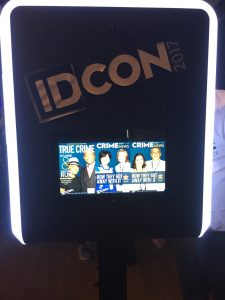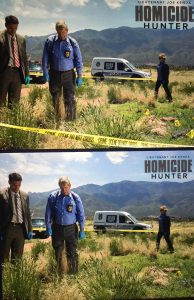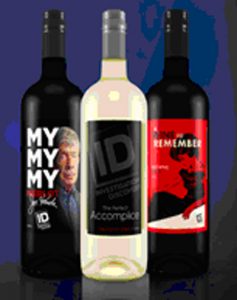Candice DeLong, Chris Hansen, fan events, Garry McFadden, Graham Hetrick, IDCon, Investigation Discovery, Joe Kenda, Maria Elena Salinas, Michelle Ward, New York City, Paula Zahn, Rod Demery, Tamron Hall, Tony Harris, true crime, TV
May 20, 2017
by Carla Hay
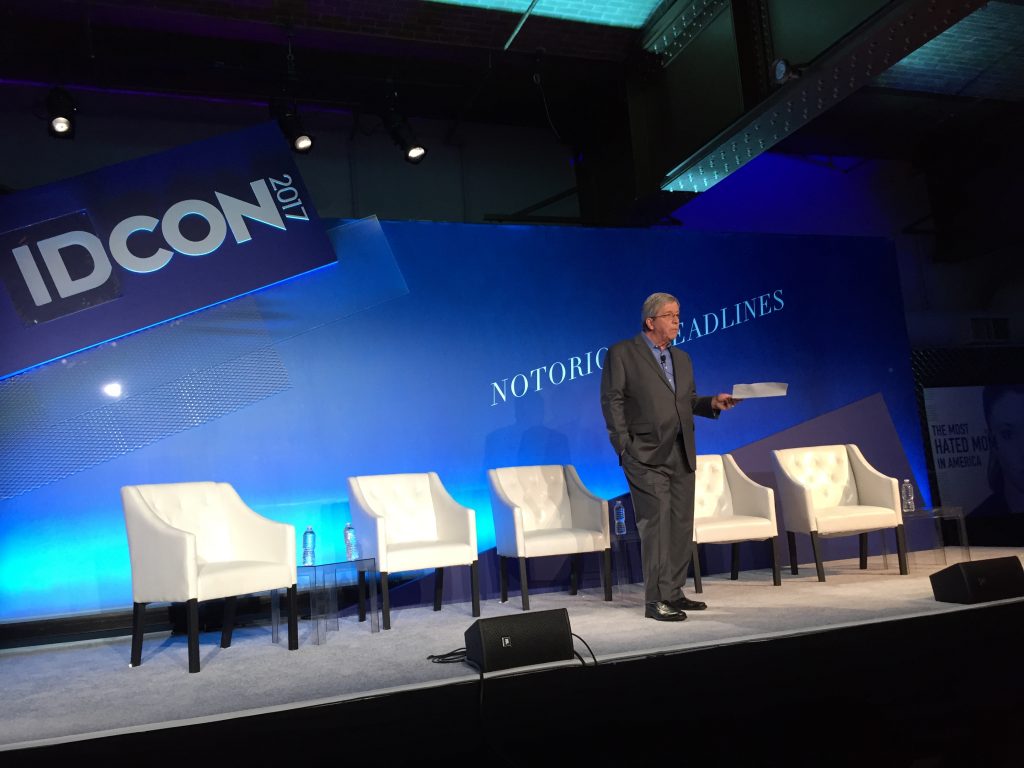
Aficionados of true crime got an unforgettable experience at Investigation Discovery’s second annual fan event IDCon, which took place at the Altman Building in New York City on May 20, 2017. ID show hosts Joe Kenda, Tony Harris (who was IDCon 2017’s lively and humorous emcee), Paula Zahn, Tamron Hall, Chris Hansen, Candice DeLong, Garry McFadden, Maria Elena Salinas, Graham Hetrick, Michelle Ward and Rod Demery all participated in the event, and most of them did meet-and-greet sessions with fans. The event kicked off with a greeting from Henry Schleiff, group president of Investigation Discovery, American Heroes Channel, and Destination America. He thanked the fans for making ID the top-rated U.S. cable network for women. IDCon 2017 also premiered sneak preview footage of the upcoming ID scripted movies “Final Vision” (about the Jeffrey MacDonald murder case) and “The Dating Game Killer” (about serial killer Rodney Alcala).

The event space expanded this year to include a downstairs lounge area. The lounge had an ID Addict Truth Booth where fans can videorecord their ID Addict confessions, some of which could be televised or posted on ID’s social media.

Other new activations this year the “Liar! Liar! Liar!” polygraph demonstration; a competitive “Be an Eyewitness” photo competition game; an “Evidence Board” to break down the facts behind the unsolved murder of Chandra Levy; and an exclusive photo booth where attendees can “Become the Notorious Headline” by having their photos imposed on mock crime-magazine covers.

IDCon 2017 attendees were served free samples the first three wines from the recently announced ID Wine Club (which is available as of June 1). There was also plenty of ID merchandise for purchase. The items included a black T-shirt that has the IDCon 2017 logo and a gray T-shirt that says “I’d Rather Be Watching ID.” (The T-shirts come is sizes S, M, L and XL.) There were also thermoses and mason jars with Kenda’s signature catch-phrase “My My My.”
All proceeds for IDCon will be donated to New York’s Silver Shield Foundation, an organization which provides educational support to families of firefighters and police officers killed in the line of duty. ID Addicts unable to make the trip to New York can watch select panels via the network’s Facebook Live streams, or go to network’s social handles at Twitter, Instagram, and SnapChat for behind-the-scenes coverage.
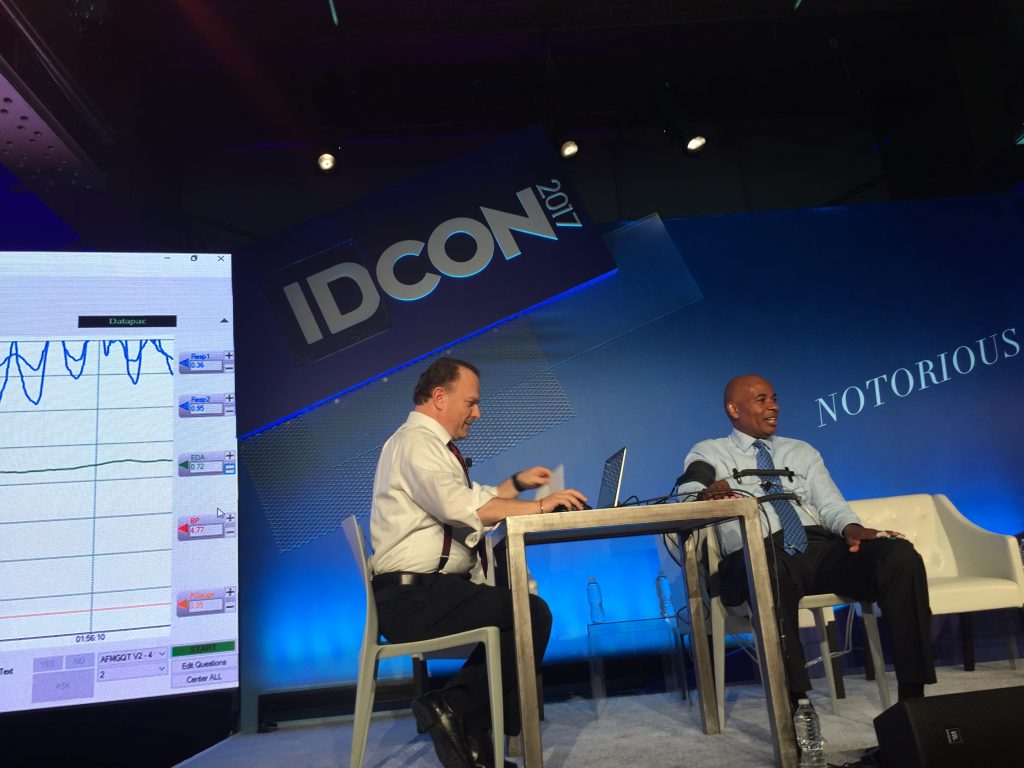
A few fans at IDCon who were posting on social media and using the hastag #IDCON2017 during the event were randomly selected to win prizes, such as selfie sticks. Attendees also had the opportunity to answer trivia questions sent via text messages to win a grand prize of a trip for two on the Kenda Cruise, a partnership with Princess Cruises. Kenda announced the winner at the end of the event.
Here were some of the highlights of IDCon 2017 panels:
Missing From the Headlines
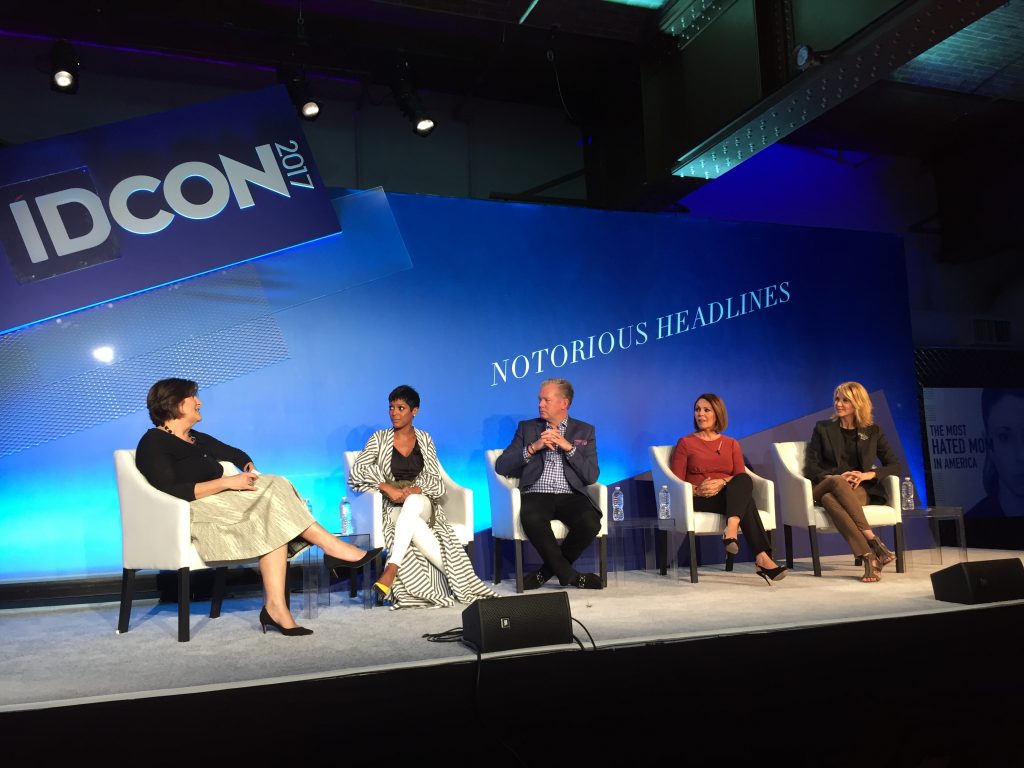
Moderated by ID senior vice president of production Sara Kozak, this panel of TV journalists—Hansen, Zahn, Hall and Salinas—discussed some of the crime cases (usually murders) that they have brought to their ID shows.
Hall mentioned that in an upcoming episode of her show “Deadline: Crime,” Tyler Perry will be featured, and he donated $100,000 toward solving the crime. She elaborated, “Tyler saw the story on the local news … And he agreed for the first time to do a sit-down, on-camera interview about this case.”
Even when cases are solved, there is often a messy aftermath that doesn’t always equal a happy ending. Zahn mentioned the case of John Purvis, who was wrongly convicted of murder and freed nine years later, as an example of a case that stands out for her. Tragically, Purvis’ mother, who was his strongest supporter in the ordeal, died before he was released from prison. And a police officer risked his job and reputation to prove that Purvis did not commit the crime. “Even after they had proven [Purvis’ innocence] through DNA technology, this cop with still dealing with people who were doubting his testimony.”
Salinas also discussed an upcoming episode of “The Real Story” about the June 2016 mass murder at the predominately gay Pulse nightclub in Orlando. She said that Omar Mateen, the shooter who was killed by police officers , may not have been motivated by terrorism but rather homophobia. Salinas said one of the people interviewed in the episode is a man who claims he was one of Mateen’s gay lovers and says the reason for the Pulse shooting was “[Mateen] wanted to get back at some men he had one-night stands with who told him they were HIV-positive.”
All of the panelists agreed that one of the most important aspects of their jobs is having crime victims’ families tell their stories on the shows. Hansen mentioned that an upcoming episode of “Killer Instinct” is about the 1997 murder of Susannah Chase, a 23-year-old in Boulder, Colorado. Her killer was tried and convicted 12 years after the murder. Hansen, who interviewed Chase’s brother and sister, noted:”When they sit down and talk about their sister 20 years after [the murder] happened, it’s almost like the first time.”
Salinas added about families affected by murders and other violent crimes, “They have something to say … We have to remember that in a crime, it’s not just the deceased who are the victims, it’s the family that’s the victim. Sometimes it’s two separate families—also the family of the perpetrator. They sometimes provide details that we didn’t know before.”
People Magazine Investigates
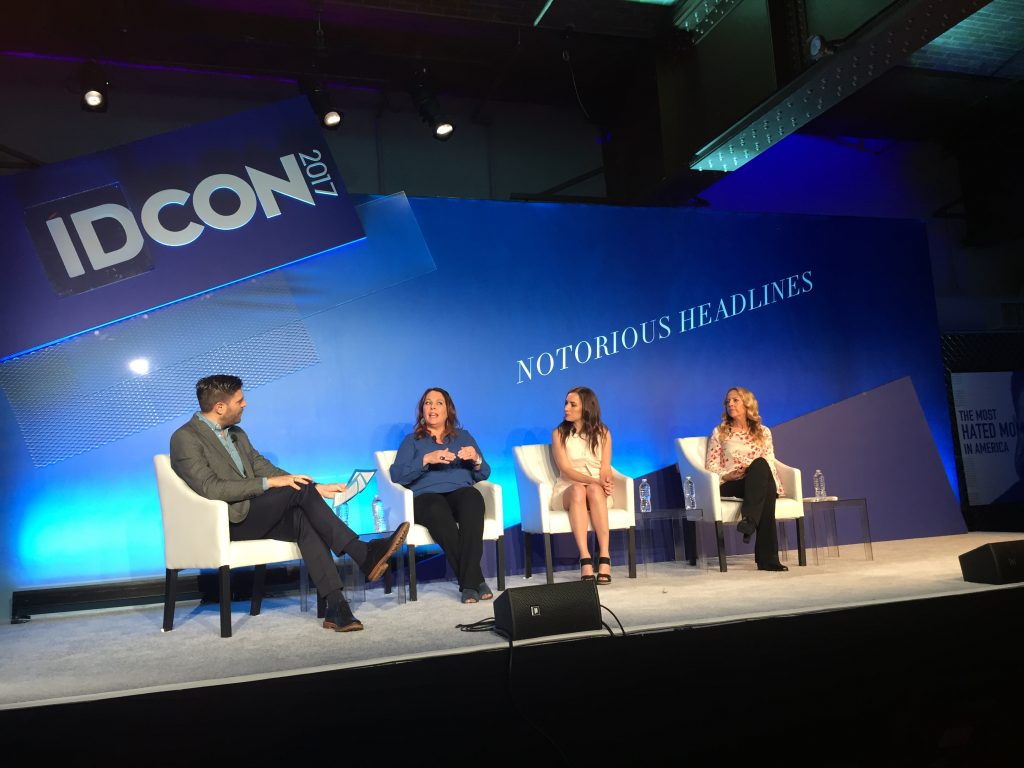
People magazine’s senior editor Alicia Dennis, senior writer Christine Peliseck and staff writer Caitlin Keating gathered for a panel moderated by deputy editor Dan Wakeford to discuss the ID series “People Magazine Investigates,” which explores true crime stories that were covered by People. The panelists talked about how it was a relief that ID respectfully handles the recreations on the show because one of their biggest concerns before the TV show began was the real people in the magazine’s crime stories would be recreated for television. The panel also discussed the series’ first episode about the Long Island serial killer (who still hasn’t been caught) and the bizarre twist of how Mari Gilbert, the mother of one of the victims, was stabbed to death by her other daughter, according to prosecutors for the crime. Gilbert’s interviews for the show were among the last she ever did.
Notorious Headlines
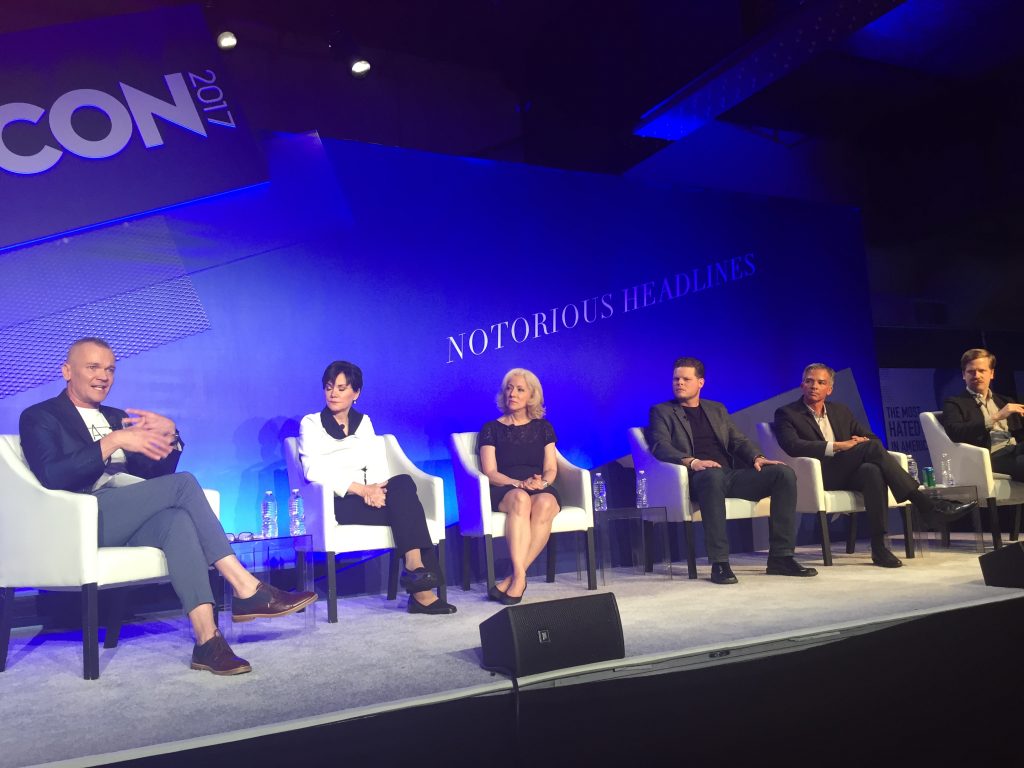
Moderated by producer and reporter Steph Watts, this panel featured hosts and producers of ID shows that covered famous crimes. The panel included FBI profiler Candice DeLong (host of “Deadly Women”); legal analyst Beth Karas (“An American Murder” mystery specials on Casey Anthony and JonBenét Ramsey); police sergeant Derrick Levasseur and forensic psychologist Kris Mohandie (commentators, “Is OJ Innocent? The Missing Evidence”); and showrunner Tim McConville (“An American Murder Mystery”/”American Scandal”).
DeLong, who was one of the few people who has interviewed Unabomber serial killer Ted Kaczynski, said he was the only “evil genius” she ever met. DeLong also recalled that one of the strangest aspects of their conversation was that he gave her advice on “how to boil turnips on an open stove” after she had asked him what it was like to live in a remote, rural area. “It was the worst date I’ve ever been on, ” she joked. DeLong also said after interviewing him as an FBI profiler and reading his journals, her opinion of Kaczynski is that he only cared about two things: “his quarter-acre of land with a shack on it and the other was killing people.”
For the still-unsolved murder of college student Chandra Levy, Karas said that Washington politics and the high-profile aspect of the case played a big role in hindering the police investigation. “You have to have press conferences constantly, you’re under scrutiny … It’s a headache, but the public has a right to know, so it’s a delicate balancing act. They made mistakes along the way.” Gary Condit, a U.S. Congressman who later admitted to having an affair with Levy, was a person of interest for years, but Karas believes that Condit (who was cleared from the investigation) “had nothing to do with the disappearance [of Chandra Levy]” and that the reason why he fell under public suspicion so quickly was “bad timing for him” in a world where the media had obsessively covered the Monica Lewinsky scandal.
In 2016, several JonBenét Ramsey TV specials (including one from ID) aired within weeks of each other. McConville said that “time” is the biggest challenge when there is race to bring these competing specials on the air. “The pressure is to work fast. It was a race to get out there to find contributors. We were aware of the other specials coming out, but I don’t think we let that knowledge influence the way we were thinking of telling the story.”
For the ID special “Is OJ Innocent? The Missing Evidence,” Mohandie said in addition to getting the cooperation of the families of Ron Goldman and Nicole Brown Simpson, it was important for the investigative team to get interviews with former Los Angeles Police Department investigator Tom Lange to directly address accusations that the police planted evidence in the OJ Simpson case. Mohandie said that other key witnesses that were interview coups for the special included Allan Park (the limousine driver who arrived at Simpson at home on the night of the murders) and witness Jill Shively, whose was dropped by the prosecution after she gave a tabloid interview. “She saw something very important that night. Whether she sold her story to a tabloid is irrelevant, in my mind. She had been blamed by the prosecution for losing the case, and [interviewing her’ gave us a chance to tell her that she had nothing to do with the loss of this case.” Levasseur added, “We were really focusing on Jason Simpson [O.J. Simpson’s oldest son] and that theory [that he might have been involved in the murders].”
The Case That Keeps Me Up at Night

Moderated by criminal psychologist Dr. Michelle Ward, this panel talked about cases solved by investigators/ID hosts Kenda (“Homicide Hunter”), Demery (“Murder Chose Me”), McFadden (“I Am Homicide”) and Hetrick (“The Coroner: I Speak for the Dead”) .
ID’s long-running “Homicide Hunter” is one of the network’s highest-rated series, so Kenda got the biggest cheers from the audience. When asked which case haunts him the most, Kenda and the other panelists gave a similar answer: “I don’t have a single case,” said Kenda, who added, “I did not solve 31 murders. All 31 haunt me to this day. Why didn’t I solved them? I solved 356 of them. People often ask me, “What was the most horrible case you’ve ever seen?”
Kenda and McFadden, who were on an IDCon panel together in 2016, mentioned many of the same things they talked about on that year’s panel, such as how their police work affected them and their personal lives. McFadden talked about a homicide victim’s daughter whom he eventually began to treat as if she were his own daughter.
One of the most interesting questions asked of the panelists was whether or not they think the worst murderers are created by nature or by nurture. Given that most serial killers and other murderers have siblings who do not become murderers too, the panelists said they believe that murderers’ disorders can be explained by “nature,” i.e., something to do with what’s going on inside the individual’s body, whether it is mental illness, a psychological defect or the effects of long-term substance abuse.
Ultimately, Demery said that murderers and other criminals “make a choice” to commit the crimes, and they should be held responsible for their choices. McFadden noted, “We all have the ability [to murder], but we may not act on it.” Hetrick added, “I think the study of environment is very important, and I think it’s important that we look at physical things ….certain pathologies of the brain. They’re all very important. They’re not as important from a personal standpoint as much as they are to understand how we can [help] society.”

